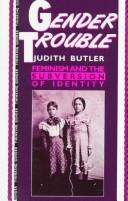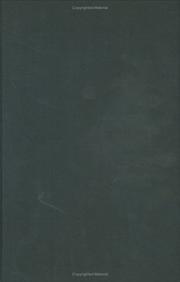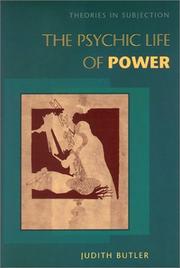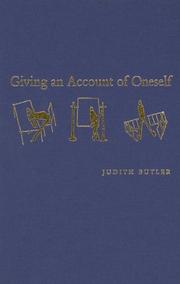| Listing 1 - 10 of 188 | << page >> |
Sort by
|
Book
Abstract | Keywords | Export | Availability | Bookmark
 Loading...
Loading...Choose an application
- Reference Manager
- EndNote
- RefWorks (Direct export to RefWorks)

ISBN: 0415900433 0415900425 Year: 1990 Publisher: New York (N.Y.): Routledge
Abstract | Keywords | Export | Availability | Bookmark
 Loading...
Loading...Choose an application
- Reference Manager
- EndNote
- RefWorks (Direct export to RefWorks)
One of the most talked-about scholarly works of the past fifty years, Judith Butler’s Gender Trouble is as celebrated as it is controversial.Arguing that traditional feminism is wrong to look to a natural, 'essential' notion of the female, or indeed of sex or gender, Butler starts by questioning the category 'woman' and continues in this vein with examinations of 'the masculine' and 'the feminine'. Best known however, but also most often misinterpreted, is Butler's concept of gender as a reiterated social performance rather than the expression of a prior reality.Thrilling and provocative, few other academic works have roused passions to the same extent.
Femininity --- Feminist theory --- Identity (Psychology) --- Sex differences (Psychology) --- Sex role --- 396 --- 396 Feminisme. Vrouwenbeweging. Vrouw en maatschappij --- Feminisme. Vrouwenbeweging. Vrouw en maatschappij --- 396 Feminism. Women's movement. Woman and society --- Feminism. Women's movement. Woman and society --- Gender role --- Sex (Psychology) --- Social role --- Gender expression --- Sexism --- Personal identity --- Personality --- Self --- Ego (Psychology) --- Individuality --- Feminism --- Feminist philosophy --- Feminist sociology --- Theory of feminism --- Femininity (Psychology) --- Women --- Philosophy --- Femininity. --- Feminist theory. --- Identity (Psychology). --- Sex differences (Psychology). --- Sex role. --- Klinische psychologie --- specifieke problemen. --- Féminité (Psychologie) --- Théorie féministe --- Identité (Psychologie) --- Différences entre sexes (Psychologie) --- Rôle selon le sexe --- Developmental psychology --- Sociology of the family. Sociology of sexuality --- Sexology --- Gender roles --- Gendered role --- Gendered roles --- Role, Gender --- Role, Gendered --- Role, Sex --- Roles, Gender --- Roles, Gendered --- Roles, Sex --- Sex roles

ISBN: 0415969220 9780415969239 0415969239 1135880751 0203606272 113588076X 1280059796 020349962X 9780203499627 1138582867 Year: 2004 Publisher: New York Routledge
Abstract | Keywords | Export | Availability | Bookmark
 Loading...
Loading...Choose an application
- Reference Manager
- EndNote
- RefWorks (Direct export to RefWorks)
'Undoing Gender' constitutes Judith Butler's recent reflections on gender and sexuality, focusing on new kinship, psychoanalysis and the incest taboo, transgender, intersex, diagnostic categories, social violence, and the tasks of social transformation. In terms that draw from feminist and queer theory, Butler considers the norms that govern--and fail to govern--gender and sexuality as they relate to the constraints on recognizable personhood. The book constitutes a reconsideration of her earlier view on gender performativity from 'Gender Trouble'. In this work, the critique of gender norms is clearly situated within the framework of human persistence and survival. And to "do" one's gender in certain ways sometimes implies "undoing" dominant notions of personhood. She writes about the "New Gender Politics" that has emerged in recent years, a combination of movements concerned with transgender, transsexuality, intersex, and their complex relations to feminist and queer theory.
Sociology of the family. Sociology of sexuality --- Sexology --- Sex role --- Gender identity --- Gender identity. --- Sex role. --- 305 --- 305 Genderstudies. Rol van de sekse. Gender. Personen vanuit interdisciplinair gezichtspunt --- Genderstudies. Rol van de sekse. Gender. Personen vanuit interdisciplinair gezichtspunt --- Sex identity (Gender identity) --- Sexual identity (Gender identity) --- Identity (Psychology) --- Sex (Psychology) --- Queer theory --- Gender role --- Sex differences (Psychology) --- Social role --- Gender expression --- Sexism --- Theatrical science --- Developmental psychology --- Philosophy --- Depth psychology --- Filosofie --- Ontwikkelingspsychologie --- Dieptepsychologie --- Sociologie van het gezin. Sociologie van de seksualiteit --- Seksuologie --- Theaterwetenschap --- Gender roles --- Gendered role --- Gendered roles --- Role, Gender --- Role, Gendered --- Role, Sex --- Roles, Gender --- Roles, Gendered --- Roles, Sex --- Sex roles --- Gender dysphoria --- Transsexualism. --- Feminism --- Gender --- Transgender --- Gay marriages --- Homosexuality --- Incest --- Lesbian relationships --- Psychoanalysis --- Sexuality --- Theory --- Book

ISBN: 0804728119 0804728127 9780804728126 9780804728119 Year: 1997 Publisher: Stanford, Calif. Stanford University Press
Abstract | Keywords | Export | Availability | Bookmark
 Loading...
Loading...Choose an application
- Reference Manager
- EndNote
- RefWorks (Direct export to RefWorks)
As a form of power, subjection is paradoxical. To be dominated by a power external to oneself is a familiar and agonizing form power takes. To find, however, that what "one" is, one's very formation as a subject, is dependent upon that very power is quite another. If, following Foucault, we understand power as forming the subject as well, it provides the very condition of its existence and the trajectory of its desire. Power is not simply what we depend on for our existence but that which forms reflexivity as well. Drawing upon Hegel, Nietzsche, Freud, Foucault, and Althusser, this challenging and lucid work offers a theory of subject formation that illuminates as ambivalent the psychic effects of social power. If we take Hegel and Nietzsche seriously, then the "inner life" of consciousness and, indeed, of conscience, not only is fabricated by power, but becomes one of the ways in which power is anchored in subjectivity. The author considers the way in which psychic life is generated by the social operation of power, and how that social operation of power is concealed and fortified by the psyche that it produces. Power is no longer understood to be "internalized" by an existing subject, but the subject is spawned as an ambivalent effect of power, one that is staged through the operation of conscience. To claim that power fabricates the psyche is also to claim that there is a fictional and fabricated quality to the psyche. The figure of a psyche that "turns against itself" is crucial to this study, and offers an alternative to describing power as "internalized." Although most readers of Foucault eschew psychoanalytic theory, and most thinkers of the psyche eschew Foucault, the author seeks to theorize this ambivalent relation between the social and the psychic as one of the most dynamic and difficult effects of power. This work combines social theory, philosophy, and psychoanalysis in novel ways, offering a more sustained analysis of the theory of subject formation implicit in such other works of the author as Bodies That Matter: On the Discursive Limits of "Sex" and Gender Trouble: Feminism and the Subversion of Identity.
Self (Philosophy) --- Power (Philosophy) --- Self --- Power (Social sciences) --- Subject (Philosophy) --- Philosophy of mind --- Moi (Philosophie) --- Pouvoir (Morale) --- Moi (Psychologie) --- Pouvoir (Sciences sociales) --- Sujet (Philosophie) --- Philosophie de l'esprit --- Social aspects. --- Aspect social --- -Personal identity --- Consciousness --- Individuality --- Mind and body --- Personality --- Thought and thinking --- Will --- Philosophy --- Empowerment (Social sciences) --- Political power --- Exchange theory (Sociology) --- Political science --- Social sciences --- Sociology --- Consensus (Social sciences) --- Authority --- Ethics --- Social aspects --- -Social aspects --- Power (Philosophy). --- Power (Social sciences). --- Self (Philosophy). --- -Consciousness --- Personal identity --- -Empowerment (Social sciences) --- Affective and dynamic functions --- Sociology of the family. Sociology of sexuality --- Hegel, Georg W.F. --- Freud, Sigmund --- Foucault, Michel --- Althusser, Louis Pierre --- Nietzsche, Friedrich --- Psychische functies --- Sociologie van het gezin. Sociologie van de seksualiteit --- Filosofische antropologie --- Philosophical anthropology --- Conscience --- Dépendance (psychologie) --- Moi (philosophie) --- Obéissance --- Pouvoir (philosophie) --- Dependency (Psychology) --- Obedience. --- Gender --- Power --- Book --- Dependence --- Emotions
Book
ISBN: 2707142379 9782707142375 Year: 2005 Publisher: Paris : La Découverte,
Abstract | Keywords | Export | Availability | Bookmark
 Loading...
Loading...Choose an application
- Reference Manager
- EndNote
- RefWorks (Direct export to RefWorks)
Dans cet ouvrage majeur publié en 1990 aux États-Unis, la philosophe Judith Butler invite à penser le trouble qui perturbe le genre pour définir une politique féministe sans le fondement d'une identité stable. Ce livre désormais classique est au principe de la théorie et de la politique queer : non pas solidifier la communauté d'une contre-culture, mais bousculer l'hétérosexualité obligatoire en la dénaturalisant. Il ne s'agit pas d'inversion, mais de subversion.Judith Butler localise les failles qui témoignent, à la marge, du dérèglement plus général de ce régime de pouvoir. En même temps, elle questionne les injonctions normatives qui constituent les sujets sexuels. Jamais nous ne parvenons à nous conformer tout à fait aux normes : entre genre et sexualité, il y a toujours du jeu. Le pouvoir ne se contente pas de réprimer ; il ouvre en retour, dans ce jeu performatif, la possibilité d'inventer de nouvelles formations du sujet.La philosophe relit Foucault, Freud, Lacan et Lévi-Strauss, mais aussi Beauvoir, Irigaray, Kristeva et Wittig, afin de penser, avec et contre eux, sexe, genre et sexualité – nos désirs et nos plaisirs. Pour jeter le trouble dans la pensée, Judith Butler donne à voir le trouble qui est déjà dans nos vies.
Feminist theory --- Gender identity --- Théorie féministe --- Identité sexuelle --- Sex role --- Sex differences (Psychology) --- Identity (Psychology) --- Femininity --- Théorie féministe --- Identité sexuelle --- Gender identity. --- Feminist theory. --- Sex (Psychology) --- Sex role. --- Femininity. --- Théorie féministe. --- Féminité. --- Identité sexuelle. --- Identité (psychologie) --- Sexualité (psychologie) --- Rôle selon le sexe. --- Différences entre sexes (psychologie) --- Féminité --- Rôle selon le sexe
Book
ISBN: 291554719X 9782915547191 Year: 2006 Publisher: Paris : Editions Amsterdam,
Abstract | Keywords | Export | Availability | Bookmark
 Loading...
Loading...Choose an application
- Reference Manager
- EndNote
- RefWorks (Direct export to RefWorks)
Gender identity --- Sex role --- Identité sexuelle --- Rôle selon le sexe --- Identité sexuelle --- Rôle selon le sexe --- Gender identity. --- Sex role.
Book
ISBN: 9781844673339 1844673332 9781784782474 Year: 2009 Publisher: London Verso
Abstract | Keywords | Export | Availability | Bookmark
 Loading...
Loading...Choose an application
- Reference Manager
- EndNote
- RefWorks (Direct export to RefWorks)
Profound exploration of the current wars, looking at violence, gender and different forms of resistance. In Frames of War, Judith Butler explores the media’s portrayal of state violence, a process integral to the way in which the West wages modern war. This portrayal has saturated our understanding of human life, and has led to the exploitation and abandonment of whole peoples, who are cast as existential threats rather than as living populations in need of protection. These people are framed as already lost, to imprisonment, unemployment and starvation, and can easily be dismissed. In the twisted logic that rationalizes their deaths, the loss of such populations is deemed necessary to protect the lives of 'the living.' This disparity, Butler argues, has profound implications for why and when we feel horror, outrage, guilt, loss and righteous indifference, both in the context of war and, increasingly, everyday life. This book discerns the resistance to the frames of war in the context of the images from Abu Ghraib, the poetry from Guantanamo, recent European policy on immigration and Islam, and debates on normativity and non-violence. In this urgent response to ever more dominant methods of coercion, violence and racism, Butler calls for a re-conceptualization of the Left, one that brokers cultural difference and cultivates resistance to the illegitimate and arbitrary effects of state violence and its vicissitudes.
Violence --- Political violence --- Mass media and public opinion --- Right and left (Political science) --- Social aspects --- Political aspects --- Political violence. --- Political aspects. --- Social aspects. --- Right and left (Political science). --- Violent behavior --- Social psychology --- Left (Political science) --- Left and right (Political science) --- Right (Political science) --- Political science --- Political crimes and offenses --- Terrorism --- Violence - Social aspects --- Violence - Political aspects --- Mass media and public opinion - United States --- Philosophical anthropology --- General ethics --- Sociology of culture --- Social problems --- terrorism --- politics --- mass media --- communicatiemedia --- politiek --- communicatietheorieën --- racisme
Book
ISBN: 9780674967755 9780674495548 0674495543 9780674495562 067449556X 0674967755 Year: 2015 Publisher: Cambridge, MA
Abstract | Keywords | Export | Availability | Bookmark
 Loading...
Loading...Choose an application
- Reference Manager
- EndNote
- RefWorks (Direct export to RefWorks)
A Times Higher Education Book of the Week Judith Butler elucidates the dynamics of public assembly under prevailing economic and political conditions, analyzing what they signify and how. Understanding assemblies as plural forms of performative action, Butler extends her theory of performativity to argue that precarity—the destruction of the conditions of livability—has been a galvanizing force and theme in today’s highly visible protests. “Butler’s book is everything that a book about our planet in the 21st century should be. It does not turn its back on the circumstances of the material world or give any succour to those who wish to view the present (and the future) through the lens of fantasies about the transformative possibilities offered by conventional politics Butler demonstrates a clear engagement with an aspect of the world that is becoming in many political contexts almost illicit to discuss: the idea that capitalism, certainly in its neoliberal form, is failing to provide a liveable life for the majority of human beings.” —Mary Evans, Times Higher Education “A heady immersion into the thought of one of today’s most profound philosophers of action…This is a call for a truly transformative politics, and its relevance to the fraught struggles taking place in today’s streets and public spaces around the world cannot be denied.” —Hans Rollman, PopMatters
Assembly, Right of --- Public meetings. --- Demonstrations. --- Performative (Philosophy) --- Social aspects. --- Public meetings --- Demonstrations --- #KVHA:Taalfilosofie --- #KVHA:Performatieve taaltheorie --- #SBIB:324H20 --- #SBIB:324H70 --- #SBIB:17H20 --- #SBIB:17H3 --- Politologie: theorieën (democratie, comparatieve studieën….) --- Politieke verandering: algemeen --- Sociale wijsbegeerte: algemeen --- Politieke wijsbegeerte --- Social aspects --- Performative (Philosophy). --- Government in the sunshine --- Open meetings --- Sunshine, Government in the --- Meetings --- Freedom of assembly --- Right of assembly --- Freedom of expression --- Liberty --- Freedom of association --- Freedom of speech --- Performativity (Philosophy) --- Language and languages --- Methodology --- Philosophy --- Semantics (Philosophy) --- Marches (Demonstrations) --- Political demonstrations --- Political marches --- Political rallies --- Public demonstrations --- Rallies (Demonstrations) --- Collective behavior --- Crowds --- Riots --- Law and legislation --- Assembly, Right of - Social aspects

ISBN: 0823225038 0823225046 Year: 2005 Publisher: New York (N.Y.) Fordham university press
Abstract | Keywords | Export | Availability | Bookmark
 Loading...
Loading...Choose an application
- Reference Manager
- EndNote
- RefWorks (Direct export to RefWorks)
What does it mean to lead a moral life? In her first extended study of moral philosophy, Judith Butler offers a provocative outline for a new ethical practice—one responsive to the need for critical autonomy and grounded in a new sense of the human subject.Butler takes as her starting point one’s ability to answer the questions “What have I done?” and “What ought I to do?” She shows that these question can be answered only by asking a prior question, “Who is this ‘I’ who is under an obligation to give an account of itself and to act in certain ways?” Because I find that I cannot give an account of myself without accounting for the social conditions under which I emerge, ethical reflection requires a turn to social theory.In three powerfully crafted and lucidly written chapters, Butler demonstrates how difficult it is to give an account of oneself, and how this lack of self-transparency and narratibility is crucial to an ethical understanding of the human. In brilliant dialogue with Adorno, Levinas, Foucault, and other thinkers, she eloquently argues the limits, possibilities, and dangers of contemporary ethical thought.Butler offers a critique of the moral self, arguing that the transparent, rational, and continuous ethical subject is an impossible construct that seeks to deny the specificity of what it is to be human. We can know ourselves only incompletely, and only in relation to a broader social world that has always preceded us and already shaped us in ways we cannot grasp. If inevitably we are partially opaque to ourselves, how can giving an account of ourselves define the ethical act? And doesn’t an ethical system that holds us impossibly accountable for full self-knowledge and self-consistency inflict a kind of psychic violence, leading to a culture of self-beratement and cruelty? How does the turn to social theory offer us a chance to understand the specifically social character of our own unknowingness about ourselves?In this invaluable book, by recasting ethics as a project in which being ethical means becoming critical of norms under which we are asked to act, but which we can never fully choose, Butler illuminates what it means for us as “fallible creatures” to create and share an ethics of vulnerability, humility, and ethical responsiveness.
Conduct of life. --- Ethics. --- Self (Philosophy) --- Self (Philosophy). --- Conduct of life --- Ethics --- Philosophy --- Deontology --- Ethics, Primitive --- Ethology --- Moral philosophy --- Morality --- Morals --- Philosophy, Moral --- Science, Moral --- Values --- Ethics, Practical --- Personal conduct --- Philosophical counseling

ISBN: 0231118945 0231504411 Year: 2000 Publisher: New York Columbia university press
Abstract | Keywords | Export | Availability | Bookmark
 Loading...
Loading...Choose an application
- Reference Manager
- EndNote
- RefWorks (Direct export to RefWorks)
Daniel McCool not only chronicles the history of water development agencies in America and the way in which special interests have abused rather than preserved the country's rivers, he also narrates the second, brighter act in this ongoing story: the surging, grassroots movement to bring these rivers back to life and ensure they remain pristine for future generations. The culmination of ten years of research and observation, McCool's book confirms the surprising news that America's rivers are indeed returning to a healthier, free-flowing condition. The politics of river restoration demonstrates how strong grassroots movements can challenge entrenched powers and win. Through passion and dedication, ordinary people are reclaiming the American landscape, forming a "river republic" of concerned citizens from all backgrounds and sectors of society. As McCool shows, the history, culture, and fate of America is tied to its rivers, and their restoration is a microcosm mirroring American beliefs, livelihoods, and an increasing awareness of what two hundred years of environmental degradation can do. McCool profiles the individuals he calls "instigators," who initiated the fight for these waterways and, despite enormous odds, have succeeded in the near-impossible task of challenging and changing the status quo. Part I of the volume recounts the history of America's relationship to its rivers; part II describes how and why Americans "parted" them out, destroying their essence and diminishing their value; and part III shows how society can live in harmony with its waterways while restoring their well-being-and, by extension, the well-being of those who depend on them.
Antigone (Greek mythology) --- Feminist theory --- Kinship --- -Ethnology --- Clans --- Consanguinity --- Families --- Kin recognition --- Feminism --- Feminist philosophy --- Feminist sociology --- Theory of feminism --- Philosophy --- Hegel, Georg Wilhelm Friedrich --- Irigaray, Luce --- Lacan, Jacques --- איריגארי, לוס --- Yiruigelai --- Feminist theory. --- Philosophy. --- Lacan, Jacques, --- Hegel, Giorgio Guglielmo Frederico --- -Philosophy --- Antigone (Greek mythology). --- Hegel, Georg Wilhelm Friedrich. --- Irigaray, Luce. --- -Feminism --- Ethnology --- Rivers --- Stream conservation --- Stream restoration --- Water --- POLITICAL SCIENCE / Public Policy / Environmental Policy. --- Hydrology --- Rehabilitation, River --- Rehabilitation, Stream --- Restoration of rivers --- Restoration of streams --- River rehabilitation --- River restoration --- Stream rehabilitation --- Restoration ecology --- Brooks --- Creeks --- Runs (Rivers) --- Streams --- Bodies of water --- Environmental aspects --- History. --- Pollution --- Restoration --- Regulation --- Antigone --- Hegel, Georg Wilhelm Friedrich, --- Antígona --- Antygona --- 安提戈涅 --- アンティゴネー --- אנטיגונה --- 안티고네 --- Антигона --- Антыгона --- Антігона --- أنتيجون --- Ἀντιγόνη --- Hēgeru, --- Hei-ko-erh, --- Gegelʹ, Georg, --- Hījil, --- Khegel, --- Hegel, G. W. F. --- Hegel, --- Hei Ge Er, --- Chenkel, --- Hīghil, --- הגל, --- הגל, גאורג וילהלם פרידריך, --- הגל, גיאורג וילהלם פרידריך, --- הגל, ג.ו.פ, --- היגל, גורג ווילהלם פרדריך, --- היגל, גיורג וילהלם פרידריך, --- 黑格尔, --- Hegel, Guillermo Federico, --- Hegel, Jorge Guillermo Federico, --- Heyel, Georg Wilhelm Friedrich, --- Higil, Gʼūrg Vīlhim Frīdrīsh, --- هگل, --- هگل، گئورگ ويلهم فريدريش,
| Listing 1 - 10 of 188 | << page >> |
Sort by
|

 Search
Search Feedback
Feedback About UniCat
About UniCat  Help
Help News
News